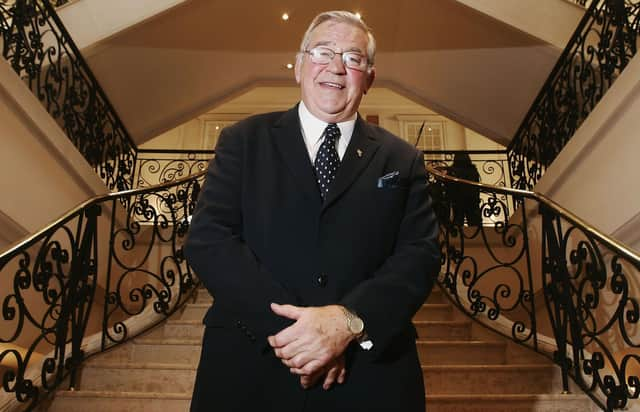Legendary Syd Millar 'helped to shape the modern game' as player, coach and administrator says ex-Lion Trevor Ringland


Millar’s passing aged 89 was announced on Sunday, sparking widespread praise for his contribution to rugby as player, coach and administrator.
His career covered playing appearances for Ballymena, Ulster, Ireland, Barbarians and the British and Irish Lions.
Advertisement
Hide AdAdvertisement
Hide AdA coaching career included the famous 1974 tour of South Africa when, shaped by Millar’s influence, the British and Irish Lions recorded 21 wins across a 22-game unbeaten run considered one of the greatest ever.
Roles as an administrator across Ballymena, Ulster, Ireland and international rugby led to praise for his “pragmatism” and “directness”.
All of which combined leave Millar as “the greatest rugby person of all time” according to former Ireland international and ex-Lion Trevor Ringland.
And Ringland feels Millar’s legacy includes a lasting impact on the sport in the current era.
Advertisement
Hide AdAdvertisement
Hide Ad"He helped to shape the modern game in many ways but he had that commitment as a volunteer to the idea of paying it back,” said Ringland. “He had wonderful characteristics of pragmatism and directness but a mischievous and wonderful sense of humour...a genuine love of the game, as a volunteer at all times.
“You look at the contribution he made to society and rugby in the world.
“He helped to develop the game in countries like Georgia, he helped handle the sport’s move into professionalism.
“I was on the Irish committee with Syd and he talked so much sense, with everyone listening when he spoke. He brought that pragmatism and directness to any problem.
Advertisement
Hide AdAdvertisement
Hide Ad“He took positions and had views, he very much led and challenged and shaped the modern game.
“The way we look after players in Irish rugby is very much down to people like Syd and positions taken 20-odd years ago.”
Ringland remembers, as a rugby-playing teen at Larne Grammar in the late 1970s, hearing Millar talk about the game during a guest appearance at the school.
The impact on Ringland of Millar’s passion and vision for rugby would only increase when he joined Ballymena.
Advertisement
Hide AdAdvertisement
Hide Ad“Syd was a great character and wonderful fun,” said Ringland. “In my time at Ballymena Syd was always involved, a fantastic servant to the club...very much the heart and soul.
“We have the Millar-McBride Room at Ballymena celebrating the achievements of Syd and Willie John McBride.
“He was a really, really nice guy – with Ballymena he would have been in and around the club whenever time allowed, during the week and then giving his perspective to the players on how the team played after games.
“He was great fun but very wise in his counsel, a lovely man.”
Advertisement
Hide AdAdvertisement
Hide AdMcBride was Lions captain for that celebrated 1974 three-month tour of South Africa and further expanded in his own tribute on Ringland’s theme of a long-term impact on rugby by Millar.
“He was a central figure in the IRFU (Irish Rugby Football Union) during the change over into the professional era,” said McBride. "We were talking about the present-day game two weeks ago and he had frustrations...some frustrations with the present-day game.
"You know the thing is the game now is 23 players, it is not 15. You have these guys running onto the field in the last 20 minutes...very few guys play 80 minutes anymore.
"All of us played 80 minutes back in ’74.
"He didn't agree with it, he didn't think it was right...the only way that players should be displaced is when they are injured.
Advertisement
Hide AdAdvertisement
Hide Ad"Because now you're putting on fresh players all the time when other players are tired. So you have fresh players playing against tired players - and it is wrong.”
McBride revealed his conversation with Millar went on to highlight the opportunity created by reduced playing time for players bigger and heavier in the modern era, the imbalance of fresh players against tired players and an increased risk of injury.
McBride also reflected on that 1974 tour and how Millar “picked it up very quickly” following the transition from player to coach.
“He went straight into coaching after he stopped playing (in 1970),” said McBride. “He had a good run as a player so his experience was always there. He saw rugby as a very simple game - which is quite right.”